Zlatan Ibrahimovic is one of most iconic names in football – something the man himself, famed for his limitless self-assurance, would surely not only corroborate but probably even propose. After all, this is the man who has referred to himself as a god and whose new book is titled I Am Football. There is no denying the fact that, in part because of this brazen chutzpah, Ibrahimovic has always been something of a divisive figure, both on and off the pitch, not only for spectators and media, but also amongst his own teammates and coaches, but the one thing that is unquestionable is his record.
Amongst other teams, Ibrahimovic has played for seven of the biggest clubs in football history – Ajax, Juventus, Inter Milan, Barcelona, AC Milan, PSG and Manchester United. He has scored goals at for every team he has played for, in impressive quantities and important moments, racking up over 500 in total, and continues to do so at the age of 37 for LA Galaxy. He has won over thirty trophies with the teams he has played in, including league championships in four of the biggest competitions in the world (Eredivisie, Serie A, La Liga, and Ligue 1) as well as countless other individual awards. His records include being the only player to have played in the Champions League with seven teams (although the one black mark in his tally is the failure to win the competition), the only player to have scored in derbies in six countries and the only player to score in his first five league matches for Barcelona – records that neither the generation’s two leading players, Messi and Ronaldo, cannot match. And this book charts each of these milestones in Ibrahimovic’s journey from Malmo to Manchester United.
The chapters focus sequentially on each of the eight clubs he played for from 1999 to 2018, opening with a snapshot of his match, minutes, goals and assists stats, a picture and a Zlatan quote before an introduction to the context of each moment in Ibrahimovic’s career, which is followed up with images and quotes from the man himself, as well as contributions from teammates and coaches before a concluding assessment on his time at each club. It’s a really appealing and easy-to-read approach. But what really sells this book and makes it stand out from the crowd is the incredible design and finish of it – it’s clearly been lovingly and artistically put together, and rather than your average hardback sports autobiography, this has the appearance and gravitas, dare I say it, of something more akin to a bible. It is a book that visually grabs you and makes it clear its subject matter is intended to be viewed as something special, extraordinary. It’s a format that very much fits with a man who wants to make his mark, to turn heads, but it’s more than just a gimmick, it is genuinely a really stylish, well-packaged and put together creation, that, to my mind, suggests a refreshing, contemporary direction that sports books could take in the future to really develop the genre. Huge praise therefore must go to the creative and design team behind it, which includes Graphic Designer Sebastian Wadsted and Project Manager Martin Ransgart. There is nothing especially overly fussy or fancy inside the pages, just simple but hugely effective use of colours, spreads and imagery to create a beautiful, minimalist, sleek look. Even the way, the statistics – or rather Zlatistics (their word, not mine) – are displayed in a comprehensive chapter at the end of the book is engaging and visually appealing.
In terms of the content itself, the range of voices, from the book’s editor to Ibrahimovic’s teammates and coaches to the man himself, make for a more complete read. And whilst I am not sure this book will completely change perceptions about Ibrahimovic, it certainly gives a more rounded view of the man – no person, after all, is completely one thing, but Ibrahimovic, for whatever reason, has often been cast as the villain. The contributions from his teammates, and to some extent his coaches, are perhaps the most telling in their breakdown of this judgement. These are the people who spent the most time with him, day in, day out, who knew him off the pitch and on it, and their assessments – from greats such as Thierry Henry and Andrea Pirlo – are all markedly similar: Ibrahimovic, they all effectively concur, is indeed a strong personality, but above all a special footballing talent and a team player on the pitch, and off it, he is a funny and likeable character – very different to the troublemaker he has often been portrayed as. There is no denying his ego, many of the quotes from the man himself ooze it, but while some call it arrogance, the contributors tend to see it as self-confidence – a requisite for success. And success is exactly what Ibrahimovic has achieved throughout his two decades at the very top of the game. So maybe, as the title of the book suggests, he is, after all, football. There are definitely few who could argue with the Zlatistics.
Jade Craddock
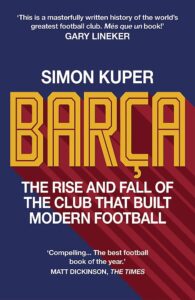 From the bestselling co-author of Soccernomics comes the story of how FC Barcelona became the most successful football club in the world – and how that envied position now hangs in the balance.
From the bestselling co-author of Soccernomics comes the story of how FC Barcelona became the most successful football club in the world – and how that envied position now hangs in the balance. Ten Big Ears is the story of one of the biggest football clubs in the world, told through an eyewitness account that spans four decades.
Ten Big Ears is the story of one of the biggest football clubs in the world, told through an eyewitness account that spans four decades.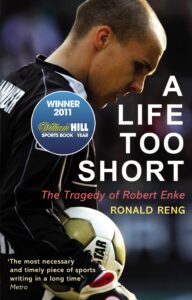 On 10 November 2009 the German national goalkeeper, Robert Enke, stepped in front of a passing train. He was thirty-two years old and a devoted husband and father.
On 10 November 2009 the German national goalkeeper, Robert Enke, stepped in front of a passing train. He was thirty-two years old and a devoted husband and father. If you engaged a football fan in word association, throwing them the name ‘Johan Cruyff’, the most expected response would be ‘Ajax’, the club he successfully played and managed and with which he is most readily associated. You might also get a few replying ‘Holland’, ‘Total Football’ or ‘14’ the number famously worn by the Dutch legend, or even ‘Barcelona’, like Ajax a club he won honours with both as a player and coach. Some may even respond ‘turn’ as in the ‘Cruyff Turn’, which originated when he twisted Swedish defender Jan Olsson inside out during their World Cup game in 1974. What is highly unlikely is that any would be prompted to say ‘Feyenoord’ – the reason? Well, Cruyff’s farewell season in 1983/84, playing for the Rotterdam based club, despite the club winning the ‘double’ (Eredivisie and KNVB Cup), is largely forgotten about, amongst all else that Cruyff achieved. Andy Bollen’s Fierce Genius: Cruyff’s Year at Feyenoord, therefore, is a welcome window on this period about Amsterdam’s most famous footballing son.
If you engaged a football fan in word association, throwing them the name ‘Johan Cruyff’, the most expected response would be ‘Ajax’, the club he successfully played and managed and with which he is most readily associated. You might also get a few replying ‘Holland’, ‘Total Football’ or ‘14’ the number famously worn by the Dutch legend, or even ‘Barcelona’, like Ajax a club he won honours with both as a player and coach. Some may even respond ‘turn’ as in the ‘Cruyff Turn’, which originated when he twisted Swedish defender Jan Olsson inside out during their World Cup game in 1974. What is highly unlikely is that any would be prompted to say ‘Feyenoord’ – the reason? Well, Cruyff’s farewell season in 1983/84, playing for the Rotterdam based club, despite the club winning the ‘double’ (Eredivisie and KNVB Cup), is largely forgotten about, amongst all else that Cruyff achieved. Andy Bollen’s Fierce Genius: Cruyff’s Year at Feyenoord, therefore, is a welcome window on this period about Amsterdam’s most famous footballing son.
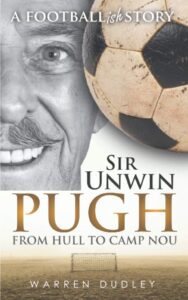 The author himself describes it as, “a comedy football autobiography about a 90 year old ex-player and raconteur called Sir Unwin Pugh. A bit Partridge, a bit Count Arthur Strong, a bit Ron Atkinson.” Traits from these three personas are presented to the reader, as Sir Unwin regals his life story against the background of an impending court case. Like Alan Partridge, Pugh is never afraid to promote his own worth and has something of the Little Englander about him, with his right-wing views evident through his story. Pugh also displays at times a pompous attitude with significant delusions about his abilities as a player and manager, and indeed his life in all aspects, features akin to the Count Arthur Strong character. In respect of Dudley’s nod to the much travelled ex-manager Ron Atkinson, Pugh comes to represent all the cliches that managers and pundits come to espouse in the game over the last few years. There are of course other influences, with this book also aiming an arrow firmly at the ‘boy-done-good’ football autobiographies.
The author himself describes it as, “a comedy football autobiography about a 90 year old ex-player and raconteur called Sir Unwin Pugh. A bit Partridge, a bit Count Arthur Strong, a bit Ron Atkinson.” Traits from these three personas are presented to the reader, as Sir Unwin regals his life story against the background of an impending court case. Like Alan Partridge, Pugh is never afraid to promote his own worth and has something of the Little Englander about him, with his right-wing views evident through his story. Pugh also displays at times a pompous attitude with significant delusions about his abilities as a player and manager, and indeed his life in all aspects, features akin to the Count Arthur Strong character. In respect of Dudley’s nod to the much travelled ex-manager Ron Atkinson, Pugh comes to represent all the cliches that managers and pundits come to espouse in the game over the last few years. There are of course other influences, with this book also aiming an arrow firmly at the ‘boy-done-good’ football autobiographies.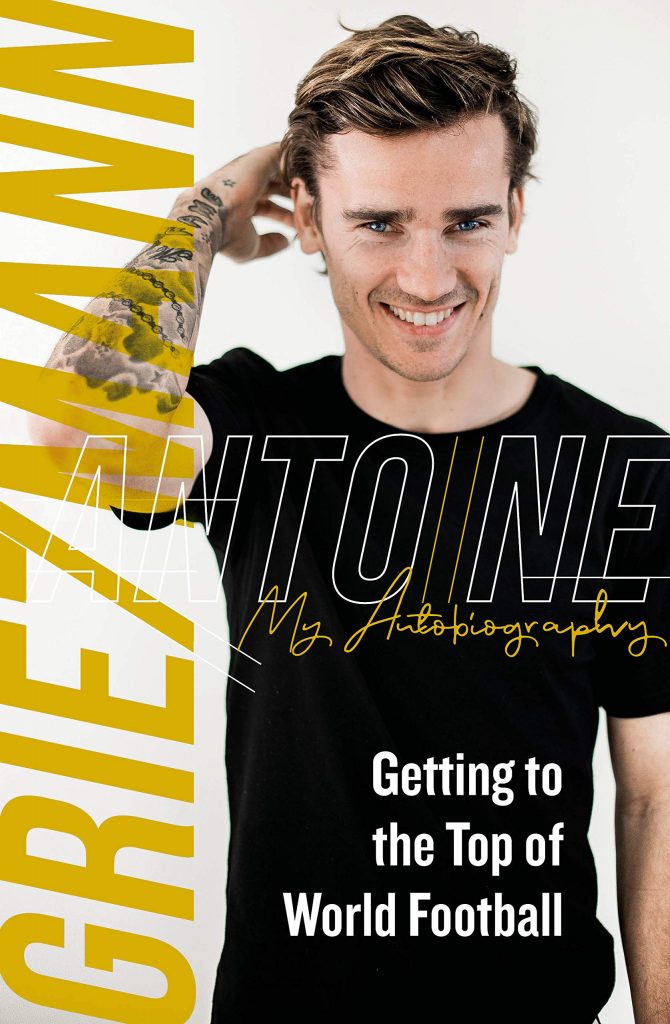
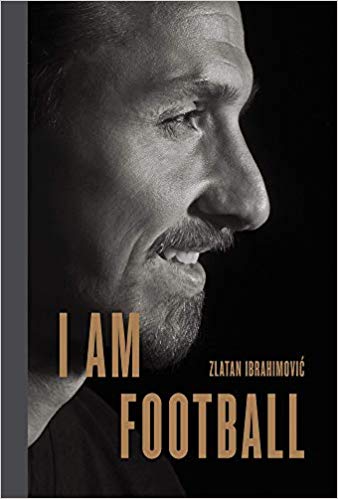
 Every now and again a book comes along which wonderfully describes the idiosyncrasies and experiences associated with being a football fan – Written In The Stars by Richard Stokoe fits into that category.
Every now and again a book comes along which wonderfully describes the idiosyncrasies and experiences associated with being a football fan – Written In The Stars by Richard Stokoe fits into that category. This book is released as ‘the official autobiography’ of Neymar Junior and is the English translation of the version published in Brazil in 2013.
This book is released as ‘the official autobiography’ of Neymar Junior and is the English translation of the version published in Brazil in 2013.